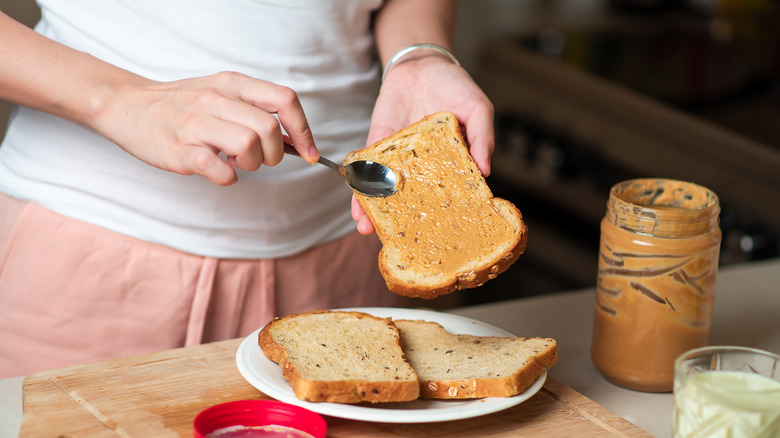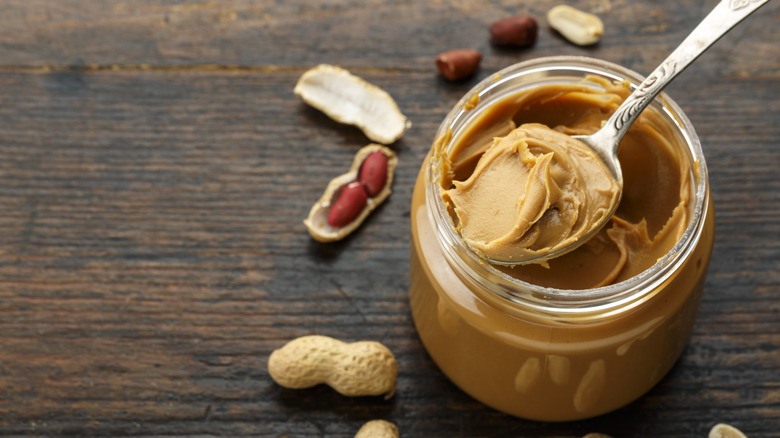When You Stop Eating Peanut Butter, This Is What Happens To Your Blood Sugar
We may receive a commission on purchases made from links.
Peanut butter is so rich, creamy, and tasty that it's sometimes hard to believe it's considered a health food. Is it really, though? If you were to Google this question, you'd likely arrive at the answer that, yes, it's healthy for you. It's good for blood sugar control, great for your heart health, it aids weight loss because the fiber in it keeps you feeling full for longer, etc. Peanut butter contains a host of nutritious ingredients: fiber, protein, and healthy fats (monounsaturated and polyunsaturated). It's also a good source of vitamin E, niacin (vitamin B3), manganese, vitamin B6, and magnesium.
However, it's important to remember that the "healthy" factor comes mainly from the peanuts. A lot of the commercially produced peanut butters might not be as healthy as you think because of other ingredients that get added in there to lengthen shelf life and add flavor, per the experts. It's safe to say that consumer awareness of nutrition labels has grown. Even so, sometimes, we may not know all that we need to know about some of the ingredients in there. We can walk away from a store having unintentionally bought a brand of peanut butter that could potentially be bad for our blood sugar levels, especially when consumed every day and in excess.
If you're wondering what happens to your body when you eat peanut butter for breakfast, the answer could lie in the type of peanut butter you just had.
Are added sugars in peanut butter a concern?
According to Toronto-based registered dietitian Abby Langer (via HuffPost), it doesn't really matter how the added sugars are labeled on a peanut butter jar. It's all sugar. What you may typically find in the form of added sugars includes things like refined sugar and syrups. "White sugar is the most refined, while palm sugar and cane juice are less refined and are lower in the glycemic index."
Sucrose (the main component in white and brown table sugar) can raise blood glucose levels. Cane and palm sugar contain some amount of sucrose, fructose, and glucose. Fructose occurs naturally in fruits and vegetables. Glucose is also naturally present in plants, and it's your body's favored source of energy. Even if palm sugar and cane juice are lower on the glycemic index (meaning they're less likely to cause blood sugar spikes), other factors (e.g., a person's activity levels, age, rate of digestion, and existing health conditions) matter.
Furthermore, have you ever noticed how there's a difference between organic and mass-produced peanut butters? Oil separation tends to happen at the top of the former (because commercially bought peanut butters have hydrogenated oil to prevent oil separation). Other additions include salt and preservatives. Per registered dietitian nutritionist Barbara Intermill (via the Atlanta Journal Constitution), though hydrogenated oils are not as bad as partially hydrogenated oils (which are known to produce trans fats that are bad for your cholesterol levels), they still add saturated fat to your peanut butter, which can increase the risk of heart disease or stroke.
So what type of peanut butter is best for blood sugar levels?
The more natural the peanut butter, the better it is for blood sugar control. Check the food labels: Stay as close as you can to peanuts ground into a paste to make that rich, buttery spread. A small amount of added salt is okay, but avoid added sugars, especially if you're concerned about surprising things that affect your blood sugar.
Take time to peruse the aisles for the healthiest brands of peanut butter you can eat. Some suggestions include Justin's Classic Peanut Butter Squeeze Packs (which contain just two ingredients: dry roasted peanuts and palm oil), Crazy Richard's 100% All-Natural Crunchy Vegan Peanut Butter (which contains only peanuts), and 365 by Whole Foods Market, Organic Creamy Peanut Butter (which only contains organic dry roasted peanuts).
If you're concerned about oil separation and having to stir the stuff every time you have to consume it, storing it upside down in the fridge may help solve this problem. And yes, all-natural peanut butters should be refrigerated after you open them. "The separated oil in unrefrigerated natural peanut butter is more likely to become rancid sooner, leading to unpleasant taste and texture," explained Margarethe A. Cooper, assistant professor of practice and Victor P. Smith Endowed Chair in Food Safety Education at the University of Arizona (via Martha Stewart).
While we're on the topic, you may want to check out unexpected signs you're eating way too much peanut butter.



